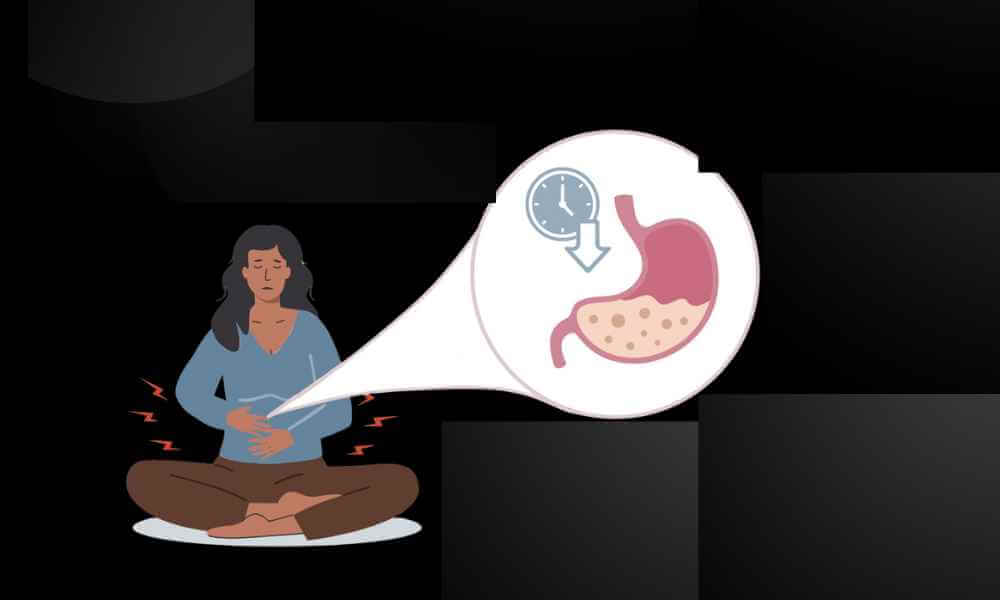Have you ever felt constantly full after eating a small meal, or been overwhelmed by anxiety that affects your digestive system? If so, you might be interested in learning more about gastroparesis and anxiety.
While both conditions are common, affecting millions of people worldwide, understanding their connection and how to manage them effectively can be a challenge.
Gastroparesis is a common problem that causes delayed stomach function. In this, there is a problem in completely digesting the food in the stomach, because the nerves connected to the digestive system do not work.
This has an impact on a person’s health and lifestyle and is also linked to anxiety disorders.
Gastroparesis means “delay in the movement of food inside the stomach”. When you eat something, your digestive system digests the food by chewing it and mixing it with digestive juices. But in gastroparesis, this process is delayed.
This happens when the stomach muscles do not work properly and food remains stagnant in the stomach, due to which there is a problem in the appetite and digestion process of the stomach.
Anxiety disorders cause stress that affects a person’s mind and body. This problem often arises suddenly and makes the person feel anxious, nervous, or afraid.
Apart from this, it also affects various parts of the body, such as increased heartbeat, difficulty in breathing, and stomach problems. Anxiety disorders require resolution, which is often done with medical and mental health experts.
The relationship between gastroparesis and anxiety disorders is deep and worth understanding. People with anxiety disorders often remain physically and mentally stressed, which also affects the digestive system.
This may also worsen the symptoms and condition of gastroparesis. Therefore, it is important to understand both these problems together and find their solutions.
How to Ease Anxiety and Take Control of Your Digestive Health

Gastroparesis: A Digestive Dilemma
Definition and Causes
Gastroparesis is a common digestive problem in which the stomach’s process of digesting food is delayed. In this problem, the stomach muscles do not work properly and food remains stagnant in the stomach. But what are the reasons behind this problem? Let’s see.
The primary cause of gastroparesis is often atresia of the stomach. These nerves help the digestive system of the stomach to efficiently digest food and produce digestive juices. When these nerves become weak or damaged, the digestion process gets delayed.
Apart from this, there may be some other reasons like diabetes, poor thyroid, neurological problems, or excessive use of medicines like antacids or opioids.
Diabetes can cause nerve damage, which affects the functioning of the digestive system. Thus, many different causes can cause gastroparesis, and it can have an impact on a person’s health.
Symptoms and Diagnosis
Symptoms of gastroparesis include common stomach problems such as persistent loss of appetite, heaviness in the stomach, gas in the stomach, and vomiting. These symptoms are usually caused by delayed stomach function.
To diagnose gastroparesis, doctors often take a personal history and study the person’s symptoms. The main tests for a person’s symptoms are done with a PET (positron emission tomography) scan, upper GI endoscopy, or a gastric emptying study.
In a PET scan, a picture of the stomach is taken under a special light through which the function of the nerves can be seen. In upper GI endoscopy, a flexible tube is inserted inside the stomach through which the condition inside the stomach can be detected.
In a gastric emptying study, a person is fed food and then an X-ray or scan is used to see how long it takes for the food to leave the stomach.
Treatment Options
Treatment of gastroparesis depends on the individual’s symptoms, condition, and cause. Here are some of the major treatment options that are often used:
Dietary changes: The symptoms of gastroparesis can be reduced by changing the diet. This includes getting into the habit of eating smaller meals, avoiding spices, and eating smaller meals. Consuming a soft and liquid diet is also beneficial.
Medications: Certain medications, such as prokinetics, which make the stomach muscles active, and antiemetics, which help prevent vomiting, are used to treat gastroparesis. These medicines help in reducing the symptoms and improving the process of digestion.
Electrical stimulation: In some cases, electrical stimulation may be used. In this, small electrical currents are used to activate the stomach muscles.
Surgical options: Generally, surgery is thought of as a last option when other treatments are unsuccessful. This may include surgery to strengthen the abdominal muscles or to reposition the upper part of the stomach.
These are some of the main treatment options available to patients with gastroparesis. Every person’s situation is different, so it is important to consult a doctor before deciding on treatment.
The Role of Anxiety in Digestive Health

Exploring the Gut-Brain Axis
The effect of anxiety is not limited only to our mind, but it also has a deep impact on our digestive health. There is a connection called the “gut-brain axis” which is the sweet connection between our gut and our brain.
To understand this relationship, we first take a closer look at the gut and the brain. Our gut, i.e. stomach, is an important part of our digestive process. Here enzymes for digestion are produced, nutrients are absorbed, and many types of bacteria live that are important for our health.
Now it is the turn of our brain. The brain is the controller of our body. It is the place of our feelings, thoughts, and problems. And in a way, it is also responsible for the operation of our stomach.
Through the gut-brain axis, there is communication between our gut and our brain. It is a strange process that involves a large part of neurotransmitters and hormones.
When we are anxious, the brain releases stress hormones such as cortisol and adrenaline. These hormones also affect the functioning of our stomach. Thus, there is a deep and profound connection between the state of our stomach and the state of our mind.
Impact of Anxiety on Digestion
Anxiety, which is a condition that affects our mind and body, can also have a profound effect on digestion. When we are anxious, our bodies produce stress hormones such as cortisol and adrenaline. These hormones affect the functioning of our digestive system.
During times of anxiety, the body’s energy resources are used for the fight-or-flight response. This means our body gets ready for fight or flight. In this condition, our stomach function is weakened so that more energy can be used in other areas.
Thus, anxiety causes delayed stomach activity. It can cause problems like heaviness in the stomach, gas, and vomiting. In some people, experiencing anxiety for a long time can lead to serious stomach problems, such as gastroparesis.
Thus, the impact of anxiety is profound on our digestive health. Therefore, along with controlling anxiety disorders, it is important to give importance to digestive health as well.
Anxiety Disorders and Gastrointestinal Symptoms
The relationship between anxiety disorders and the digestive system is deep and serious. People with anxiety disorders often experience stomach problems, and these problems manifest as delayed bowel movements.
Individuals with anxiety disorders often experience symptoms such as abdominal pain, heaviness, gas, and vomiting. These symptoms may be a sign of delayed stomach function. Additionally, in some people, anxiety disorders cause loss of appetite, which can also lead to weight loss.
Digestive problems like gastroparesis are also more common in patients with anxiety disorders. In this, the stomach muscles do not work and there is a problem in digesting food. In patients with anxiety disorders, the risk of developing such problems is higher because anxiety affects the digestive system.
Thus, the relationship between anxiety disorders and digestive health is deep and serious. Therefore, it is important to both address anxiety disorders and take care of digestive health.
Read Also: Homeopathy for Bipolar Disorder: What You Need to Know
Gastroparesis and Anxiety: Intersecting Paths

Recognizing the Link
There is a deep and serious relationship between gastroparesis and anxiety which has a profound impact on a person’s life. It is important to understand this relationship so that proper treatment can be given and the person can be helped to cope with the problems.
In anxiety patients, stomach problems are often encountered. These problems can cause delays in stomach function. Additionally, digestive problems such as gastroparesis have also been shown to be associated with anxiety disorders.
During times of anxiety, the body produces stress hormones that affect the digestive system and can worsen gastroparesis symptoms.
Thus, it is important for a person to understand the relationship between gastroparesis and anxiety, especially if the person has both problems. Recognizing this relationship can help a person understand his health and choose the right treatment path.
How Anxiety Exacerbates Gastroparesis Symptoms
Anxiety, which is a condition that affects our mind and body, can greatly aggravate the symptoms of gastroparesis. The reason for this is the stress hormones such as cortisol and adrenaline produced in the body during times of anxiety.
During times of anxiety, the production of these stress hormones affects stomach function. The stomach muscles become weak and the digestion process gets delayed. Its effect is that the symptoms of heaviness in the stomach, gas, vomiting, and other digestive problems increase.
The effects of anxiety can be even more profound in patients with gastroparesis. In patients with anxiety disorders, symptoms of digestive problems are often more severe and difficult to manage.
Thus, anxiety can make gastroparesis symptoms even worse. Therefore, it is important to both address anxiety and take care of digestive health.
Psychological Impact on Patients
The relationship between gastroparesis and anxiety is not only physical but also has a deep impact on the person at the mental level. Patients with anxiety disorders experience stress, anxiety, and restlessness, which affects their mental and physical well-being.
Anxiety patients often have concerns for their condition, such as how their food will be digested, or what they can and cannot eat. Moreover, facing problems can make them uncertain and unstable, which further worsens their mental and physical condition.
Thus, the impact of anxiety on patients with gastroparesis is profound and impacts their lives. Because of this, it is important to address the mental and physical health of these individuals so they can get the right help and support.
Mechanisms at Play
Stress Hormones and Digestive Function
Stress is a process that prepares our body to face any situation. When we are stressed, our body produces stress hormones such as cortisol and adrenaline.
These stress hormones also affect our digestive activity. Cortisol and adrenaline directly affect the digestive system, affecting the digestion process.
Cortisol reduces stomach motility, meaning the stomach muscles become weak and digestion time increases. This results in heaviness, gas, and other problems due to food retention in the stomach.
Thus, stress hormones have a serious effect on our digestive activity. When we are under stress, our stomach also gets stressed and problems arise in the digestion process.
Autonomic Nervous System Dysregulation
The autonomic nervous system is an important part of our body’s functioning. Its main function is to control the vital processes of our body, such as heartbeat, breathing, and digestion.
During times of anxiety and stress, the autonomic nervous system may lose control. It affects the functioning of our stomach. When the autonomic nervous system loses control, the abdominal muscles stop working or work abnormally.
It affects the digestion process. If the stomach muscles do not work, food is not digested smoothly, and this causes problems like heaviness in the stomach, gas, and vomiting.
Cognitive-Behavioral Factors
Cognitive-behavioral factors are the relationship between our mind and body that influence our thoughts and behavior. In patients with anxiety disorders, cognitive-behavioral factors can also cause digestive problems.
In patients with anxiety disorders, the person’s thoughts and behavior are affected. People may be restricted or excessive in their food intake, or their way of chewing food may be wrong.
Additionally, anxiety patients often find themselves facing stomach-related problems, which increases their stress and anxiety.
Thus, cognitive-behavioral factors also influence our digestive problems. If a person does not pay attention to his worries and behavior, his digestive activity also becomes abnormal. This causes heaviness in the stomach, gas, and other problems.
Because of this, understanding and controlling cognitive-behavioral factors is important if digestive health is to be improved.
Understanding Hearing Loss and Anxiety & Coping Strategies
Managing Gastroparesis and Anxiety Together

Holistic Approaches to Treatment
To address gastroparesis and anxiety problems together, a holistic treatment process can be used that addresses the physical, mental, and spiritual levels.
Diet and Exercise: Digestive health can be improved by making changes in diet and doing regular exercise. To reduce digestive problems, smaller meals and soft diets can be consumed. Exercise also helps reduce physical and mental stress.
Meditation and Breathing Exercises: By adopting the process of meditation and pranayama regularly, anxiety and stress can be reduced. This process provides peace and a pleasant experience to the body which helps in improving mental health.
Counseling and Therapy: Through counseling and therapy, a person can express his feelings and find solutions to anxiety disorders. It involves cognitive-behavioral therapy (CBT), relaxation techniques, and stress management techniques.
Medication: In some cases, medications can also be used to reduce the symptoms of gastroparesis and anxiety. Medicines prescribed by the doctor can be used regularly.
Thus, the problems of gastroparesis and anxiety can be solved using the all-purpose treatment process. It focuses on the physical, mental, and spiritual levels, which gives the person the ability to cope with the situation in a better way.
Medications and Therapies
To address the problems of gastroparesis and anxiety, a variety of medications and therapies can be used to help the person cope and manage the problems.
Prokinetic medications: Prokinetic medications help reduce the symptoms of gastroparesis. These medicines activate the stomach muscles and help in improving the digestion process.
Antidepressants: In some cases, antidepressant medications may be used to treat anxiety disorders. These medicines help in reducing stress and anxiety.
Cognitive-Behavioral Therapy (CBT): CBT is an effective mental therapy process that helps a person pay attention to their thoughts and behavior. In this, the person is taught how to improve his thoughts and how to deal with anxiety.
Calming techniques: Calming techniques, such as deep breathing exercises, meditation, and progressive muscle relaxation, help reduce stress and anxiety.
Dietary changes: Digestive problems can be reduced by making dietary changes, such as eating smaller meals and soft foods.
By using these medicines and therapies, the symptoms of gastroparesis and anxiety can be reduced and the person gets better health and ability to live. It is important to consult a doctor to decide the right treatment.
Lifestyle Modifications
To manage gastroparesis and anxiety problems together, certain lifestyle changes can be made that help the person cope with those problems.
Dietary changes: The symptoms of gastroparesis can be reduced by making dietary changes, such as eating smaller meals and soft foods. By avoiding spices and fried foods, stomach problems can be reduced.
Stress management techniques: Stress management techniques, such as deep breathing exercises, yoga, and meditation, help reduce anxiety and stress. This helps the person to remain calm and composed.
Controlled dietary intake: Digestive problems can be reduced by maintaining a controlled diet, such as dividing food into smaller portions and eating small meals. Apart from this, it is also important to have the right amount of nutrients in the diet.
Controlled exercise: By doing controlled exercise, such as pranayam, walking, and yoga, physical and mental stress can be reduced. Regular exercise also improves digestive problems.
By making these lifestyle changes, a person can improve their digestive health and mental health. It is also important to consult a doctor and follow the treatment regularly.
Coping Strategies for Patients

Mindfulness and Relaxation Techniques
For patients experiencing gastroparesis and anxiety, the use of mindfulness and calming techniques can be an effective way to reduce their stress and anxiety.
Mindfulness: Meditation is a process in which individuals pay attention to their thoughts and experiences, without dwelling on them. By practicing meditation, individuals become more aware of their present moment situation and think less about worries. This makes their mind calm and stable.
Pranayam (Breathing Exercises): By practicing deep breathing exercises through Pranayam, a person can reduce his stress and anxiety. Taking deep breaths and exhaling slowly helps the body feel calm and relaxed.
Progressive Muscle Relaxation (PMR): PMR is a process in which individuals activate different parts of their body one by one and then release them. With this, body stress can be reduced and the person feels calm and relaxed.
Yoga: Pranayama and asanas of yoga provide physical and mental peace to the person. By regular practice of yoga, a person keeps his body and mind healthy and stable.
By regularly practicing these mindfulness and calming techniques, patients can reduce their stress and anxiety and improve their digestive health.
Dietary Adjustments
For patients struggling with gastroparesis and anxiety, making dietary changes can be an important step in improving their digestive health.
Smaller meals: Instead of larger meals, patients should eat smaller meals, spaced a few hours apart. Eating small meals makes the digestion process easier and there is no feeling of heaviness in the stomach.
Soft diet: Consuming a soft diet can also be beneficial for gastroparesis patients. This includes cooked vegetables, lentils, porridge, and soups. This diet is easily digested and reduces stomach problems.
Avoid fiber-rich foods: Fiber-rich foods, such as salads, fruits, and vegetables, may increase gastroparesis symptoms. By reducing their intake, patients can avoid problems like heaviness and gas in the stomach.
Drink more fluids: It is also important to drink more water and other fluids. This helps in digesting food and reduces the feeling of heaviness in the stomach.
Keep a food diary: Patients should keep a food diary in which they keep a record of the food they eat and their problems. This helps them to make appropriate changes in their diet.
By making these dietary changes, patients can improve their digestive health and resolve stomach problems. It is also important to consult a doctor and follow the treatment regularly.
Support Networks
For patients struggling with gastroparesis and anxiety, having a support network is an important refuge. This network provides them with help and support in solving their problems.
Support of family and friends: Patients should receive support and assistance from their family and friends. Their company gives them mental and emotional strength.
Anxiety disorder support groups: Anxiety disorder support groups and online communities provide patients with an opportunity to share their experiences and learn from others. In this, patients can get support and advice from each other.
Support from the doctor and therapist: It is also important to keep in regular contact with the doctor and therapist. They are helpful to the patients to solve their problems and get regular treatment.
Self-help resources: Patients can use self-help resources, such as books, articles, and online videos, to find solutions to their problems. This helps them to understand and solve their problems.
With the help of these support networks, patients can find solutions to their problems and maintain stability and happiness in their lives.
Stress Relaxation vs Creep: Understanding Materials Behavior
Seeking Professional Help

Importance of Multidisciplinary Care
For patients struggling with gastroparesis and anxiety, having multilingual therapy is an important aspect. It helps in understanding their problems properly and solving them.
Specialist Medicine: Specialist medicine provides the right treatment to the patients by understanding their specific circumstances. Gastroenterologist plays an important role in the treatment of gastroparesis, while psychiatrist treats anxiety disorders.
Mental Health Therapist: A mental health therapist provides solutions to patients for their mental and emotional problems. He helps them through counseling and therapy to reduce their stress and anxiety.
Dietitian: A dietitian helps patients make the right changes in their diet. He helps them to choose the right food and avoid digestive problems.
Physical Therapist: A physical therapist helps in improving the physical condition of the patients through physical exercises and yoga. He guides them in controlled exercises so that their body remain healthy and stable.
Having multilingual therapy is important because it provides patients with a holistic treatment that takes into account physical, mental, and dietary conditions. With this, patients get solutions to their problems and their lives become better.
Finding the Right Healthcare Team
Finding the right healthcare team is an important step for patients struggling with gastroparesis and anxiety. It provides them with the right treatment and support to solve their problems.
Gastroenterologist: By choosing a good gastroenterologist, patients can get important advice in the treatment of their gastroparesis. He guides them to the right medicines and treatments.
Mental Health Therapist/Psychiatrist: Keeping in touch with a mental health therapist or psychiatrist is important for patients with anxiety disorders. They provide them with solutions to mental and emotional problems and help them through the right therapy and counseling.
Dietitian/Nutritionist: With the advice of a dietitian or nutritionist, patients can make appropriate changes in their diet. They help them choose the right nutrients and reduce digestive problems.
Primary Care Specialist: Primary Care Specialist looks after the primary health of the patients and refers them to other specialists. He keeps them healthy and helps them follow their treatment with proper regularity.
Physical Therapist: A physical therapist helps in improving the physical condition of the patients. He guides them in controlled exercises and yoga which keeps their body healthy and strong.
Having the right healthcare team is important as it provides patients with the right solutions and treatment for their problems. Patients should keep in regular touch with their healthcare team and follow their recommendations.
Advocating for Yourself
Becoming an advocate for yourself is an important step when you’re seeking health care, especially with issues like gastroparesis and anxiety. This step helps direct you to professionals who can provide the right treatment and support.
Speaking up: When communicating with your healthcare professionals, it’s important to speak up. Express your problems and concerns clearly and systematically so that you can receive the right advice and treatment.
Stay in touch: Stay in touch with your healthcare team regularly. If you encounter any new problems or any treatment is unsuccessful, contact your doctor immediately and inform him about your condition.
Complain: If you feel any kind of problem or discomfort during your treatment or support, then express your complaint at the right time. Your healthcare team will listen to you and provide you with the right help.
Find support: If you find it difficult to find solutions to your problems, finding support can be a good option. Ask for help from your family, friends, or other supporters to help you find the right solution.
It is important to become an advocate for yourself so that you can be successful in living a healthy and stable life. Speak up, seek solutions to your problems, and stay in regular contact with your healthcare team.
The Road to Recovery
Setting Realistic Expectations
Setting realistic expectations is an important step toward recovery. It takes you in the right direction and helps you progress.
Set realistic goals: Set realistic goals for your recovery that feel feasible to you and that are consistent with your situation. Set small, progressive goals instead of impossible or extremely long-term goals.
Don’t expect perfect health: The recovery process can be a long and rocky journey. So, don’t expect perfect health. It may take some time to reach your goals, so be patient and committed.
Be progressive and flexible: Be progressive and flexible to achieve your goals. Occasionally, there are changes along the way or ups and downs over the course of a few days. One should not give up and make timely adjustments to the changes.
Monitoring Progress
Translating your progress is an important part of making progress toward recovery. It helps you find out where you are and how much distance is left to reach your goal.
Set goals and criteria: First of all, remember your set goal and measure your progress accordingly. It provides you with a perspective on where you stand what you need to do and how.
Use controlled diaries or trackers: Use controlled diaries or online trackers to track your daily routine. With this, you can translate your eating habits, exercise, and other important activities.
Controlled trials and tests: Have your doctor perform controlled trials and tests to monitor your condition and progress. This lets you know what effect your treatment is having and what further improvement is needed.
Use a health support network: Stay in regular contact with your healthcare team and keep them informed about your progress. They can provide you with the right guidance and support tailored to your situation.
It is important to translate your progress so that you can reach your goals and move in the right direction.
Celebrating Small Wins
Appreciating small wins is an important step in moving toward recovery. It motivates you and gives you the strength to move forward.
Celebrate small goals: Celebrate small goals when you achieve them. Even if it’s something small, like following a controlled diet or making time for controlled exercise, look at it as a small victory and celebrate.
Remember the simplicity of your journey: Sometimes, we forget about the small wins while keeping our bigger goals in mind. Remember the simplicity of every step of your journey and enjoy it too.
Stay alert and stay motivated: Understanding the importance of small wins gives you new motivation to move towards your future goals. With this, you keep yourself motivated and move towards your goals.
Share with friends and family: Share your small wins with your friends and family. By sharing your happiness with them, you get support and support, which helps in moving forward.
Appreciating small wins keeps you motivated as you move toward recovery and helps you maintain your resolve. Honor every step and continue to enjoy your journey.
Conclusion
Throughout this blog post, we’ve explored the connection between gastroparesis and anxiety, including symptoms, treatment options, and the impact of anxiety on the digestive system.
We’ve also discussed the importance of tracking progress, celebrating small wins, and seeking professional support.
While managing gastroparesis and anxiety can be challenging, you are not alone. By working with your healthcare team, developing a personalized treatment plan, and adopting healthy coping mechanisms, you can take control of your health and live a fulfilling life.
Remember, every step you take towards managing these conditions is a step towards a brighter future. Don’t hesitate to reach out for support – your doctor and loved ones are there to guide you on this journey.
I hope you have liked the information we have shared in our article, to know more about this you can read our other article too.
Facts & Stats on Gastroparesis and Anxiety
Gastroparesis:
- Prevalence: According to the National Institute of Diabetes and Digestive and Kidney Diseases (NIDDK), gastroparesis affects an estimated 30,000 people in the United States each year.
- Age: While it can occur at any age, gastroparesis is most commonly diagnosed in women between the ages of 30 and 50. A 2023 study published in the Journal of Clinical Gastroenterology suggests a slight increase in diagnoses among younger adults as well.
- Cause: In about half of all cases, the cause of gastroparesis is unknown (idiopathic). Diabetes is a leading known cause .expand_more
Anxiety:
- Prevalence: The Anxiety and Depression Association of America (ADAA) reports that anxiety disorders are the most common mental illness in the United States, affecting an estimated 40 million adults (18 and older) in the US as of 2022.expand_more
- Types: There are several different types of anxiety disorders, including generalized anxiety disorder, social anxiety disorder, panic disorder, and phobias.expand_more
- Comorbidity: People with gastroparesis are significantly more likely to also experience anxiety disorders compared to the general population. A 2021 study published in Digestive Diseases and Sciences found a strong correlation between the severity of gastroparesis symptoms and anxiety levels.
Resources
Gastroparesis:
- National Institute of Diabetes and Digestive and Kidney Diseases: https://www.niddk.nih.gov/health-information/digestive-diseases/gastroparesis
- Gastroparesis Patient Association International: https://aboutgastroparesis.org/
Anxiety:
- National Institute of Mental Health: https://www.nimh.nih.gov/health/topics/anxiety-disorders
- Anxiety and Depression Association of America: https://adaa.org/
- MentalHealth.gov: https://www.samhsa.gov/mental-health
Comorbidity:
- National Center for Complementary and Integrative Health: https://www.ncbi.nlm.nih.gov/pmc/articles/PMC5323455/
- Digestive Diseases and Sciences: https://pubmed.ncbi.nlm.nih.gov/33273022/
FAQs
Q1: What is gastroparesis?
A1: Gastroparesis is a digestive condition characterized by delayed stomach emptying, where the stomach muscles do not function properly, leading to food remaining in the stomach for an extended period.
Q2: What are the primary causes of gastroparesis?
A2: The primary causes of gastroparesis include nerve damage, particularly in atresia of the stomach nerves, diabetes, poor thyroid function, neurological disorders, and excessive use of certain medications like antacids or opioids.
Q3: How is gastroparesis diagnosed?
A3: Gastroparesis is diagnosed through a combination of medical history assessment, symptom evaluation, and diagnostic tests such as PET scans, upper GI endoscopy, or gastric emptying studies.
Q4: What are the treatment options for gastroparesis?
A4: Treatment options for gastroparesis include dietary changes (eating smaller meals, avoiding spicy foods), medications (prokinetics, antiemetics), electrical stimulation, and in severe cases, surgery.
National Institute of Diabetes and Digestive and Kidney Diseases: https://www.niddk.nih.gov/health-information/digestive-diseases/gastroparesis.
Q5: How does anxiety affect gastroparesis?
A5: Anxiety can exacerbate gastroparesis symptoms by triggering the release of stress hormones that weaken stomach muscles and delay digestion, leading to increased stomach discomfort and digestive issues.